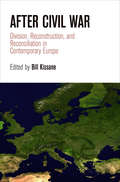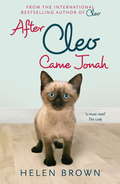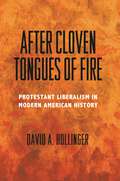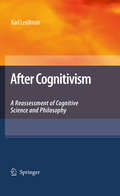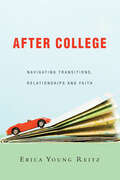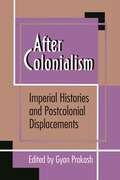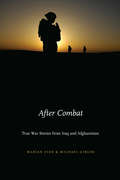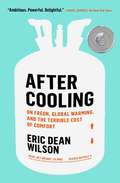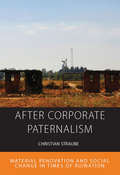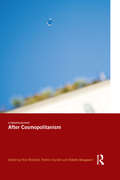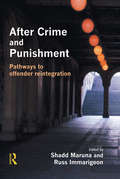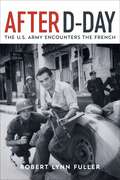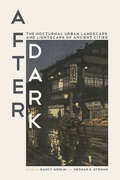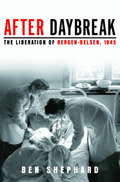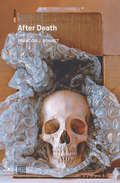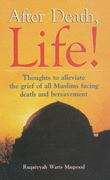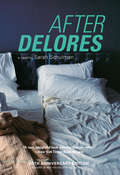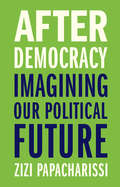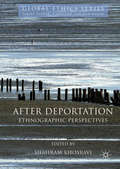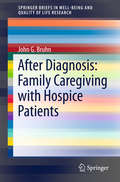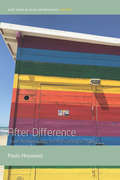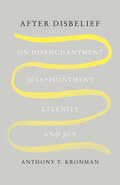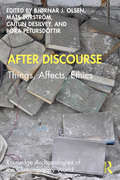- Table View
- List View
After Civil War: Division, Reconstruction, and Reconciliation in Contemporary Europe (National and Ethnic Conflict in the 21st Century)
by Bill KissaneCivil war inevitably causes shifts in state boundaries, demographics, systems of rule, and the bases of legitimate authority—many of the markers of national identity. Yet a shared sense of nationhood is as important to political reconciliation as the reconstruction of state institutions and economic security. After Civil War compares reconstruction projects in Bosnia, Cyprus, Finland, Greece, Kosovo, Northern Ireland, the Republic of Ireland, Spain, and Turkey in order to explore how former combatants and their supporters learn to coexist as one nation in the aftermath of ethnopolitical or ideological violence.After Civil War synthesizes research on civil wars, reconstruction, and nationalism to show how national identity is reconstructed over time in different cultural and socioeconomic contexts, in strong nation-states as well as those with a high level of international intervention. Chapters written by anthropologists, historians, political scientists, and sociologists examine the relationships between reconstruction and reconciliation, the development of new party systems after war, and how globalization affects the processes of peacebuilding. After Civil War thus provides a comprehensive, comparative perspective to a wide span of recent political history, showing postconflict articulations of national identity can emerge in the long run within conducive institutional contexts.Contributors: Risto Alapuro, Vesna Bojicic-Dzelilovic, Chares Demetriou, James Hughes, Joost Jongerden, Bill Kissane, Denisa Kostovicova, Michael Richards, Ruth Seifert, Riki van Boeschoten.
After Cleo, Came Jonah
by Helen BrownJonah entered Helen Brown's life not long after she was diagnosed with breast cancer and had begun recovery from a mastectomy. His arrival coincided with the finalisation of her previous book, Cleo, as well as preparations for the wedding of her son and struggles with her daughter's determination to embark on a spiritual journey. Jonah, as it happened, was just as headstrong as Helen's daughter. So while Helen attempted to deal with her own mortality and help arrange a wedding, her daughter took off to war-torn Sri Lanka and Jonah fled down the street.In Cats and Daughters, Helen Brown writes with honesty and humour about family life, its serious setbacks and life-changing events. She also learns that sometimes the best thing a strong mother and cat slave can do is step back, have faith in those she loves and be grateful nothing's perfect. As Helen writes in her dedication, this book is 'to cats and daughters who don't always come when called'.
After Cloven Tongues of Fire: Protestant Liberalism in Modern American History
by David A. HollingerThe important role of liberal ecumenical Protestantism in American historyThe role of liberalized, ecumenical Protestantism in American history has too often been obscured by the more flamboyant and orthodox versions of the faith that oppose evolution, embrace narrow conceptions of family values, and continue to insist that the United States should be understood as a Christian nation. In this book, one of our preeminent scholars of American intellectual history examines how liberal Protestant thinkers struggled to embrace modernity, even at the cost of yielding much of the symbolic capital of Christianity to more conservative, evangelical communities of faith.If religion is not simply a private concern, but a potential basis for public policy and a national culture, does this mean that religious ideas can be subject to the same kind of robust public debate normally given to ideas about race, gender, and the economy? Or is there something special about religious ideas that invites a suspension of critical discussion? These essays, collected here for the first time, demonstrate that the critical discussion of religious ideas has been central to the process by which Protestantism has been liberalized throughout the history of the United States, and shed light on the complex relationship between religion and politics in contemporary American life.After Cloven Tongues of Fire brings together in one volume David Hollinger's most influential writings on ecumenical Protestantism. The book features an informative general introduction as well as concise introductions to each essay.
After Cognitivism: A Reassessment of Cognitive Science and Philosophy
by Karl LeidlmairThis book comprises a collection of papers dealing with the reassessment of thinking in Cognitive Science and in Philosophy today. Still dependent on basic assumptions of Cartesian philosophy, Cognitive Science took over the mistakes of classical computational models. Instead of being treated as mere or pure explanations of mental processes with hindsight, these models were mistakenly used as more or less literal causal descriptions of the (working of the) mind. A clear insight into the relevance of embodied and embedded knowledge is not only a central topic in AI research; it can become a driving force for a reassessment of philosophy. Philosophy, which is struggling with the two opposite alternatives of cultural relativism and rationalism, both of which have turned out to be dead ends, is in need of a reassessment of reasoning. What is needed is a reasoning without reference to ultimate reasons which at the same time is grounded (and doesn't fall into the trap of cultural relativism).
After College: Navigating Transitions, Relationships and Faith
by Erica Young Reitz"The first year out was one of the hardest years of my life." —Curt
After Colonialism: Imperial Histories and Postcolonial Displacements (Princeton Studies in Culture/Power/History)
by Gyan PrakashAfter Colonialism offers a fresh look at the history of colonialism and the changes in knowledge, disciplines, and identities produced by the imperial experience. Ranging across disciplines--from history to anthropology to literary studies--and across regions--from India to Palestine to Latin America to Europe--the essays in this volume reexamine colonialism and its aftermath. Leading literary scholars, historians, and anthropologists engage with recent theories and perspectives in their specific studies, showing the centrality of colonialism in the making of the modern world and offering postcolonial reflections on the effects and experience of empire. The contributions cross historical analysis of texts with textual examination of historical records and situate metropolitan cultural practices in engagements with non-metropolitan locations. Interdisciplinarity here means exploring and realigning disciplinary boundaries. Contributors to After Colonialism include Edward Said, Steven Feierman, Joan Dayan, Ruth Phillips, Anthony Pagden, Leonard Blussé, Gauri Viswanathan, Zachary Lockman, Jorge Klor de Alva, Irene Silverblatt, Emily Apter, and Homi Bhabha.
After Combat: True War Stories from Iraq and Afghanistan
by Marian Eide Michael GiblerApproximately 2.5 million men and women have deployed to Iraq and Afghanistan in the service of the U.S. War on Terror. Marian Eide and Michael Gibler have collected and compiled personal combat accounts from some of these war veterans. In modern warfare no deployment meets the expectations laid down by stories of Appomattox, Ypres, Iwo Jima, or Tet. Stuck behind a desk or the wheel of a truck, many of today’s veterans feel they haven’t even been to war though they may have listened to mortars in the night or dodged improvised explosive devices during the day. When a drone is needed to verify a target’s death or bullets are sprayed like grass seed, military offensives can lack the immediacy that comes with direct contact.After Combat bridges the gap between sensationalized media and reality by telling war’s unvarnished stories. Participating soldiers, sailors, marines, and air force personnel (retired, on leave, or at the beginning of military careers) describe combat in the ways they believe it should be understood. In this collection of interviews, veterans speak anonymously with pride about their own strengths and accomplishments, with gratitude for friendships and adventures, and also with shame, regret, and grief, while braving controversy, misunderstanding, and sanction. In the accounts of these veterans, Eide and Gibler seek to present what Vietnam veteran and writer Tim O’Brien calls a “true war story”—one without obvious purpose or moral imputation and independent of civilian logic, propaganda goals, and even peacetime convention.
After Cooling: On Freon, Global Warming, and the Terrible Cost of Comfort
by Eric Dean WilsonThis dazzlingly original work of literary nonfiction interweaves the science and history of the powerful refrigerant (and dangerous greenhouse gas) Freon with a haunting meditation on how to live meaningfully and morally in a rapidly heating world.In After Cooling, Eric Dean Wilson braids together air-conditioning history, climate science, road trips, and philosophy to tell the story of the birth, life, and afterlife of Freon, the refrigerant that ripped a hole larger than the continental United States in the ozone layer. As he traces the refrigerant&’s life span from its invention in the 1920s—when it was hailed as a miracle of scientific progress—to efforts in the 1980s to ban the chemical (and the resulting political backlash), Wilson finds himself on a journey through the American heartland, trailing a man who buys up old tanks of Freon stockpiled in attics and basements to destroy what remains of the chemical before it can do further harm. Wilson is at heart an essayist, looking far and wide to tease out what particular forces in American culture—in capitalism, in systemic racism, in our values—combined to lead us into the Freon crisis and then out. It&’s a story that offers a rare glimpse of environmental hope, suggesting that maybe the vast and terrifying problem of global warming is not beyond our grasp to face.
After Corporate Paternalism: Material Renovation and Social Change in Times of Ruination (Integration and Conflict Studies #24)
by Christian StraubeIn this ethnographic study of post-paternalist ruination and renovation, Christian Straube explores social change at the intersection of material decay and social disconnection in the former mine township Mpatamatu of Luanshya, one of the oldest mining towns on the Zambian Copperbelt. Touching on topics including industrial history, colonial town planning, social control and materiality, gender relations and neoliberal structural change, After Corporate Paternalism offers unique insights into how people reappropriate former corporate spaces and transform them into personal projects of renovation, fundamentally changing the characteristics of their community.
After Cosmopolitanism
by Rosi Braidotti Bolette Blaagaard Patrick HanafinAt a time when social and political reality seems to move away from the practice of cosmopolitanism, whilst being in serious need of a new international framework to regulate global interaction, what are the new definitions and practices of cosmopolitanism? Including contributions from leading figures across the humanities and social sciences, After Cosmopolitanism takes up this question as its central challenge. Its core argument is the idea that our globalised condition forms the heart of contemporary cosmopolitan claims, which do not refer to a transcendental ideal, but are rather immanent to the material conditions of global interdependence. But to what extent do emerging definitions of cosmopolitanism contribute to new representative democratic models of governance? The present volume argues that a radical transformation of cosmopolitanism is already ongoing and that more effort is needed to take stock of transformations which are both necessary and possible. To this end, After Cosmopolitanism calls for an understanding of cosmopolitanism that is more attentive to the material reality of our social and political situation and less focused on linguistic analyses of its metaphorical implications. It is the call for a cosmopolitanism that is also a cosmopolitics.
After Crime and Punishment
by Shadd Maruna Russ ImmarigeonThe issue of resettling ex-prisoners and ex-offenders into the community has become an increasingly important one on both sides of the Atlantic. In the USA the former Attorney General Janet Reno identified the issue as 'one of the most pressing problems we face as a nation' in view of the massive prison population and the rapid increase in rates of incarceration, while in the UK it has become an increasingly important issue for similar reasons, and the subject of recent reports by HM Inspectorate of Prisons and HM Inspectorate of Probation, as well as from the Social Exclusion Unit of the Home Office. Yet this issue has not been well served by the criminological literature, and the new policies and programmes that have been set up to address the problem have not been well grounded in criminological thinking. This book seeks to address the important set of issues involved by bringing together the best of recent thinking and research into desistance from crime, drawing upon research in both the UK and the USA, and with a distinct focus on how this might impact upon the design and implementation of ex-offender reintegration policy.
After D-Day: The U.S. Army Encounters the French
by Robert Lynn FullerAfter D-Day is one of a small but growing body of works that examine the Allied liberators of France. This study focuses on both the French experience of the U.S. Army and the American soldiers’ reaction to the French during the liberation and its immediate aftermath. Drawing on French and American archival materials, as well as dozens of memoirs, diaries, letters, and newspapers, Robert Lynn Fuller follows French and American interactions, starting in the skies over France in 1942 and ending with the liberation of Alsace in 1945. Fuller pays special attention to French life in the war zones, where living under constant shelling offered a miserable experience for those forced to endure it. The French stoically withstood those travails—sometimes inflicted by the Americans—when they saw their sacrifices as the price of liberation and victory over Germany. As Fuller shows, when the French did not believe afflictions brought by the Americans advanced the cause of success, their tolerance waned, sometimes dramatically. Fuller maintains that the Allied bombing of France was an important yet often overlooked chapter of World War II, one that inflicted more death and destruction than the ground war still to come. Yet the ground campaign, which began with the Allied invasion of Normandy, unleashed enormous violence that killed, injured, or rendered homeless tens of thousands of French civilians. Fuller examines French and American records of the fate of civilians in the principal battle zones, Normandy and Lorraine, as well as in overlooked liberated regions, such as Orléanais and Champagne, that largely escaped widespread damage and casualties. Despite French gratitude toward the Americans for the liberation of their country, relations began to cool in the fall and winter of 1944 as progress on the battlefield slowed and then appeared to reverse with the German offensive in the Ardennes. Revealing in stark detail the experiences of French civilians with the American military, After D-Day presents a compelling coda to our understanding of the Allied conquest of German-occupied France.
After Dark: Poems about Nocturnal Animals
by David L. HarrisonThis collection of twenty-two poems explores the fascinating lives of North American nocturnal animals.When the sun goes down, many animals come out. Crickets chirp their crickety song hoping to attract a mate. Cougars bury their leftovers for later, leaving few clues for others to follow. Armadillos emerge from their dens to dig for worms, leaving holes in the lawns they disturb. This collection of poetry from acclaimed children's author and poet David L. Harrison explores the lives of animals who are awake after dark. Stephanie Laberis's beautifully atmospheric illustrations will draw in readers, and extensive back matter offers more information about each animal.
After Dark: The Nocturnal Urban Landscape and Lightscape of Ancient Cities
by Nancy Gonlin Meghan E. StrongAfter Dark explores the experience of nighttime within ancient urban settings. Contributors present material evidence related to how ancient people manipulated and confronted darkness and night in urban landscapes, advancing our knowledge of the archaeology of cities, the archaeology of darkness and night, and lychnology (the study of ancient lighting devices). Sensory archaeology focuses on the sensual experience of the nocturnal environment—the sights, sounds, smells, tastes, and feel of an ancient city—and the multi-faceted stimuli that diverse urban populations experienced in the dark. Contributors investigate night work—for example, standing guard or pursuing nocturnal trades—and nightlife, such as gambling at Chaco Canyon. They also examine how urban architecture, infrastructure, and the corresponding lighting were inextricably involved in enabling nighttime pursuits and signaling social status. The subjects of the night, darkness, and illumination taken together form a comprehensive framework for analyzing city life. After Dark embraces night as a conceptual lens through which to view the material and visual cultures of the ancient world and, in doing so, demonstrates a wealth of activities, behaviors, and beliefs that took place between dusk and dawn. This perspective greatly enriches the understanding of urban life and its evolution and has much to offer archaeologists in deepening an examination of complexity and inequality. This volume will be of interest to any scholar or student of the past who is interested in urban activities and the significance of the night in urban settings. Contributors: Susan M. Alt, J. Antonio Ochatoma Cabrera, Martha Cabrera Romero, Tiffany Earley-Spadoni, Kirby Farrah, Nancy Gonlin, Anna Guengerich, Christopher Hernandez, John Janusek, Kristin V. Landau, Maggie L. Popkin, Monica L. Smith, Meghan E. Strong, Susan Toby Evans, Robert S. Weiner
After Daybreak
by Ben Shephard"I find it hard even now to get into focus all these horrors, my mind is really quite incapable of taking in everything I saw because it was all so completely foreign to everything I had previously believed or thought possible." British Major Ben Barnett's words echoed the sentiments shared by medical students, Allied soldiers, members of the clergy, ambulance drivers, and relief workers who found themselves utterly unprepared to comprehend, much less tend to, the indescribable trauma of those who survived at the Bergen-Belsen concentration camp.The liberation of Bergen-Belsen by the British in April 1945 was a defining point in history: the moment the world finally became inescapably aware of the Holocaust. But what happened after Belsen was liberated is still a matter of dispute. Was it an epic of medical heroism or the culmination of thirteen years of indifference to the fate of Europe's Jews? This startling investigation by acclaimed documentary filmmaker and historian Ben Shephard draws on an extraordinary range of materials-contemporary diaries, military documents, and survivors' testimonies-to reconstruct six weeks at Belsen beginning on April 15, 1945, and reveals what actually caused the post-liberation deaths of nearly 14,000 concentration camp inmates who might otherwise have lived. Why did it take almost two weeks to organize a proper medical response? Why were the medical teams sent to Belsen so poorly equipped? Why, when specialists did arrive, did they get so much of the medicine plain wrong?For the first time, Shephard explores the humanitarian and medical issues surrounding the liberation of the camp and provides a detailed, illuminating account that is far more complex than had been previously revealed. This gripping book confronts the terrifying aftermath of war with questions that still haunt us today.From the Hardcover edition.
After Death
by Francois J. BonnetA disturbing portrait of a society deliriously dreaming itself as eternal, instantaneous, and infinite. At least for the time being, we humans are still finite and mortal—but death isn't what it used to be. As the body is technologically extended in space and time, we are split between our finitude and our doubled presence in a limitless web of signs, an “immortal” world of information. After Death offers a penetrating philosophical diagnosis of our contemporary condition, describing not only an anesthesia, but an amnesia in which the compulsions of a hyper-present colonize both past and future, prevailing over any sense of duration, becoming, or appreciation of the “thickness of the real.” Are we living in a kind of counterfeit eternity in which we are effectively already dead? Against the anxiety of the constant present, how can we hope to return to the experience of being in time and facing death? After Death is a disturbing portrait of a society deliriously dreaming itself as eternal, instantaneous, and infinite.
After Death, Life! Thoughts to alleviate the grief of all Muslims facing death and bereavement
by Ruqaiyyah Waris MaqsoodBack of book--Death is a highly traumatic business, both for those who are dying, and for those who are caring for them. There are so many fears, so many questions, so many worries about coping after the death has taken place. This book is written primarily for those who have lost loved ones and are struggling with bereavement and coming to terms with that loss. Muslims accept the existence of life after death as a part of their faith. When faced with the fact of death, it naturally becomes a prime concern, and colours the way the dying person and the bereaved think and act. This book offers practical advice, not only on Islamic attitudes to the dying, and the correct procedures of burial according to the Sunnah or the Prophet, but also much to console and strengthen the bereaved, to help them though this sad but inevitable experience. Ruqaiyyah Waris Maqsood, a teacher and writer, was Head of Religious Studies at various schools in England. She took her honours degree as a Christian theologian at Hull University, in 1963. After extensive travels in the Middle East, she embraced Islam. Among her twenty books on many aspects of religion she has written the much acclaimed Teach Yourself Islam and The Muslim Marriage Guide.
After Defeat: How the East Learned to Live with the West (Cambridge Studies in International Relations)
by Ayşe ZarakolNot being of the West; being behind the West; not being modern enough; not being developed or industrialized, secular, civilized, Christian, transparent, or democratic - these descriptions have all served to stigmatize certain states through history. Drawing on constructivism as well as the insights of social theorists and philosophers, After Defeat demonstrates that stigmatization in international relations can lead to a sense of national shame, as well as auto-Orientalism and inferior status. Ayşe Zarakol argues that stigmatized states become extra-sensitive to concerns about status, and shape their foreign policy accordingly. The theoretical argument is supported by a detailed historical overview of central examples of the established/outsider dichotomy throughout the evolution of the modern states system, and in-depth studies of Turkey after the First World War, Japan after the Second World War, and Russia after the Cold War.
After Delores
by Sarah SchulmanA madcap mixture of romance, crime and passion among a group of colorful women in New York City's lower east side.
After Democracy: Imagining Our Political Future
by Zizi PapacharissiWhat do ordinary citizens really want from their governments? Democracy has long been considered an ideal state of governance. What if it&’s not? Perhaps it is not the end goal but, rather, a transition stage to something better. Drawing on original interviews conducted with citizens of more than thirty countries, Zizi Papacharissi explores what democracy is, what it means to be a citizen, and what can be done to enhance governance. As she probes the ways governments can better serve their citizens and evolve in positive ways, Papacharissi gives a voice to everyday people, whose ideas and experiences of capitalism, media, and education can help shape future governing practices. This book expands on the well-known difficulties of realizing the intimacy of democracy in a global world—the &“democratic paradox&”—and presents a concrete vision of how communications technologies can be harnessed to implement representative equality, information equality, and civic literacy.
After Deportation: Ethnographic Perspectives (Global Ethics)
by Shahram KhosraviThis book analyses post-deportation outcomes and focuses on what happens to migrants and failed asylum seekers after deportation. Although there is a growing literature on detention and deportation, academic research on post-deportation is scarce. The book produces knowledge about the consequences of forced removal for deportee's adjustment and "reintegration" in so-called "home" country. As the pattern of migration changes, new research approaches are needed. This book contributes to establish a more multifaceted picture of criminalization of migration and adds novel aspects and approaches, both theoretically and empirically, to the field of migration research.
After Diagnosis: Family Caregiving with Hospice Patients (SpringerBriefs in Well-Being and Quality of Life Research)
by John G. BruhnThis brief provides approaches to help family caregivers understand the role of caregiving, its challenges and consequences. Using real life case examples, it illustrates the essentials of family caregiving. The caregiving role can be a source of caregiver stress and can become increasingly burdensome. People are now living longer and acquiring chronic diseases, which makes it necessary to involve caregivers to assist in disability care for longer periods of time, and live out their end-time at home, which means caregivers are more and more needed, especially at the end-of-life. This brief illustrates the role and scope of caregiving and its future growth. It is useful to physicians, social workers, sociologists, psychologists, nurses, public health, public policy and families and has a broad appeal for use in courses on Death and Dying.
After Difference: Queer Activism in Italy and Anthropological Theory (WYSE Series in Social Anthropology #6)
by Paolo HeywoodQueer activism and anthropology are both fundamentally concerned with the concept of difference. Yet they are so in fundamentally different ways. The Italian queer activists in this book value difference as something that must be produced, in opposition to the identity politics they find around them. Conversely, anthropologists find difference in the world around them, and seek to produce an identity between anthropological theory and the ethnographic material it elucidates. This book describes problems faced by an activist "politics of difference," and issues concerning the identity of anthropological reflection itself—connecting two conceptions of difference whilst simultaneously holding them apart.
After Disbelief: On Disenchantment, Disappointment, Eternity, and Joy
by Anthony T. KronmanAn intimate, philosophic quest for eternity, amidst the disenchantments and disappointments of our time &“Aims to persuade America&’s &‘relentlessly rational&’ elites to acknowledge the existence of &‘divinity.&’ . . . Kronman&’s ambition is to repair &‘the schism between those for whom religion continues to matter and those who view it with amusement or contempt.&’&”—Tunku Varadarajan, Wall Street Journal &“In this deceptively quiet and self-effacing book, Anthony Kronman makes an audacious argument: the most important things in our lives make sense only if we believe the world is divine. In a sense, we already believe it, if only we could find the words. Here they are.&”—Jedediah Britton-Purdy, author of After Nature: A Politics for the Anthropocene Many people of faith believe the meaning of life depends on our connection to an eternal order of some kind. Atheists deride this belief as a childish superstition. In this wise and profound book, Anthony Kronman offers an alternative to these two entrenched positions, arguing that neither addresses the complexities of the human condition. We can never reach God, as religion promises, but cannot give up the longing to do so either. We are condemned by our nature to set goals we can neither abandon nor fulfill, yet paradoxically are able to approach more closely if we try. The human condition is one of inevitable disappointment tempered by moments of joy. Resolutely humanistic and theologically inspired, this moving book offers a rational path to the love of God amidst the disenchantments of our time.
After Discourse: Things, Affects, Ethics (Routledge Archaeologies of the Contemporary World)
by Bjørnar J. OlsenAfter Discourse is an interdisciplinary response to the recent trend away from linguistic and textual approaches and towards things and their affects. The new millennium brought about serious changes to the intellectual landscape. Favoured approaches associated with the linguistic and the textual turn lost some of their currency, and were followed by a new curiosity and concern for things and their natures. Gathering contributions from archaeology, heritage studies, history, geography, literature and philosophy, After Discourse offers a range of reflections on what things are, how we become affected by them, and the ethical concerns they give rise to. Through a varied constellation of case studies, it explores ways of dealing with matters which fall outside, become othered from, or simply cannot be grasped through perspectives derived solely from language and discourse. After Discourse provides challenging new perspectives for scholars and students interested in other-than-textual encounters between people and the objects with which we share the world.
